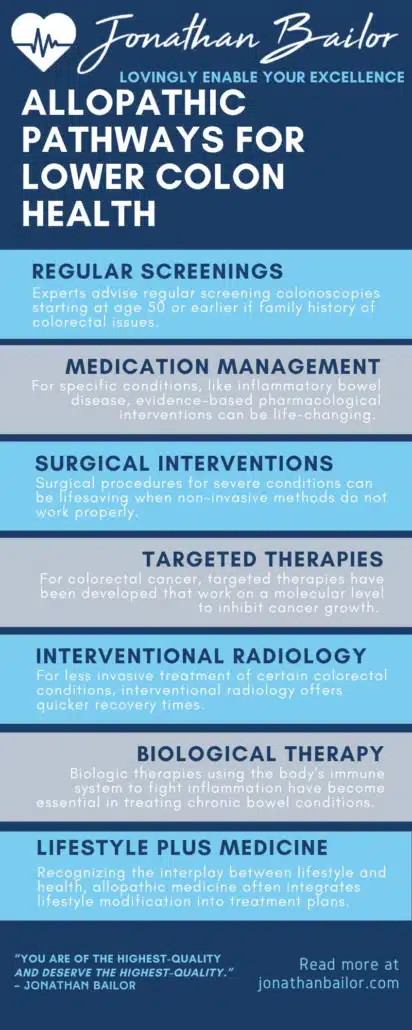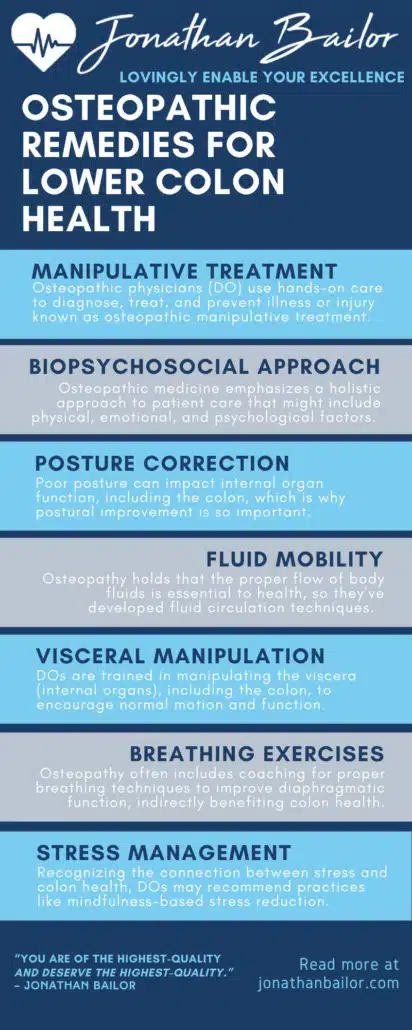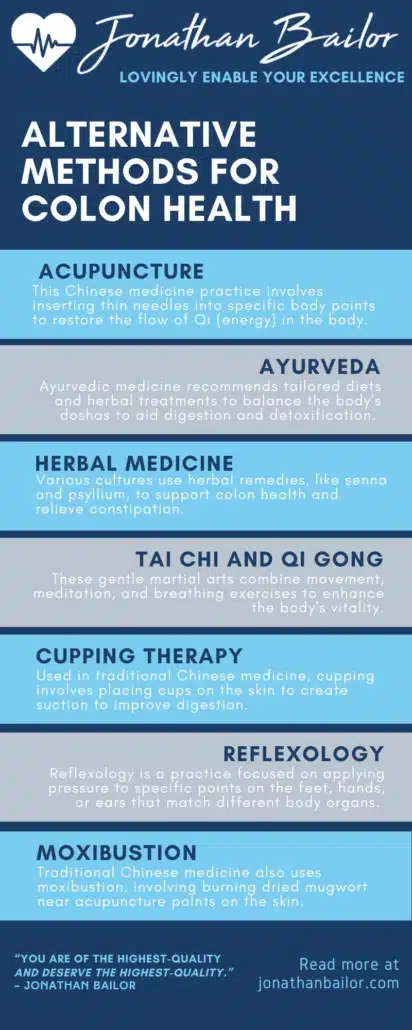Your Guide to 28 Evidence-Based Treatments to Enhance Lower Colon Health
Here is your best 2024 guide to 28 evidence-based treatments to enhance lower colon health in this Colon Health article with Jonathan Bailor!
Imagine having a set of tools, verified by science, to help you cultivate a thriving lower colon, the unsung hero in your digestive symphony. These treatments aren’t whispered secrets but rather evidence-based strategies poised to reinforce your health from within. Think of this not as a general broadcast but as a personal conversation about the health of your lower colon—a vital aspect of well-being that deserves attention and care.
Really give your colon a chance to heal with our 21 Tips for Keeping Your Colon Healthy at Every Age and 20 Easy Daily Habits to Enhance Your Colon Health guides!
The health of our lower colon is a cornerstone of our overall vitality, particularly as we embrace the richness of life beyond fifty. It’s about ensuring that the garden within us flourishes with every nurturing practice we adopt. This isn’t a tale spun from mere hearsay; it’s a narrative built on the solid ground of research and clinical wisdom.
Whether you’re managing a bustling household, enjoying the freedom of life after kids, or you’re in the heart of the workforce, these treatments are for you. And they’re worth talking about over a cup of tea with friends or during that precious family time. Sharing is a crucial aspect of caring, particularly when it comes to health.
So, let’s walk through these 28 evidence-based treatments that promote good colon health and promise to be allies for your lower colon, ensuring it receives the respect and care it truly deserves.
Modern Care: Allopathic Approaches to Lower Colon Health
1. Screening and Surveillance
The American Cancer Society says early detection is paramount to maintaining lower colon health. Allopathic medicine recommends regular screening colonoscopies starting at age 50 or earlier if there’s a family history of colorectal issues. This preventative measure can detect precancerous growths and colon cancer in the earliest stages when treatment is most effective.
2. Medication Management
For conditions like irritable bowel syndrome or chronic inflammatory bowel disease, evidence-based pharmacological interventions can be life-changing. The use of antispasmodics, laxatives, or aminosalicylates under a doctor’s guidance can manage symptoms and improve quality of life.
3. Surgical Interventions
Surgical procedures, such as resections for obstructions or severe disease, can be lifesaving when non-invasive methods are insufficient. These are carefully considered options when all other treatments have not provided relief or in cases of high-risk polyps or cancer.
4. Targeted Therapies
In cases of colorectal cancer, allopathic medicine has developed targeted therapies that work on a molecular level to inhibit cancer growth. These treatments are customized based on individual genetic markers and have opened new doors in personalized medicine to keep the colon healthy.
5. Interventional Radiology
For less invasive treatment of certain colorectal conditions, interventional radiology offers options like angiographic embolization to control bleeding or stent placement to address obstructions, preserving normal bowel function and offering quicker recovery times.
6. Biological Therapy
Biologic therapies that use the body’s immune system to fight inflammation have become a cornerstone of allopathic treatment for chronic conditions like Crohn’s disease. These drugs, tailored to each individual’s disease pattern, offer a targeted approach to maintaining colon health.
7. Lifestyle and Medicine Integration
Recognizing the interplay between lifestyle and health, allopathic medicine often integrates lifestyle modification into treatment plans. This may include medically supervised diet plans to prevent colon cancer, physical activity recommendations, and stress management techniques to support medical treatments and enhance their effectiveness. These lifestyle interventions can help reduce colorectal cancer risk.

Feeling Better Is Priceless, That's Why We Don't Put A Price On It!
“It’s Like A Free and Medically Valid Version of Noom and Weight Watchers Online”
~ Dr. Doctor Matthew Oleshiak, MD
Click the 'LEARN MORE' button below for free lifetime access to the fast fix program developed by Jonathan and top Ivy League Medical Doctors
LEARN MOREP.S. It's not a free trial. It's not part of the program for free. The entire program is free, forever, for real! No credit card needed.
Harmonizing Body and Mind: Osteopathic Interventions for Lower Colon Health
1. Osteopathic Manipulative Treatment (OMT)
Osteopathic physicians (DO) use hands-on care to diagnose, treat, and prevent illness or injury. Using OMT, a DO might gently apply pressure, stretch, or massage to address lower colon issues like constipation, thereby enhancing the mobility of the gastrointestinal tract and facilitating better function.
2. Biopsychosocial Approach
Osteopathic medicine emphasizes a holistic approach to patient care. This might include addressing the physical symptoms and considering the emotional and psychological factors contributing to gastrointestinal distress, ensuring a comprehensive treatment strategy for colon health.
3. Posture Correction Therapies
Poor posture can impact internal organ function, including the colon. Osteopathic physicians may employ therapies to correct postural imbalances, facilitate proper colon function, and mitigate issues such as constipation or bloating.
4. Fluid Mobility Enhancement
Osteopathy holds that the proper flow of body fluids is essential to health. Techniques promoting blood circulation and lymph fluid in the abdomen can support the colon’s health by improving nutrient delivery and waste removal.
5. Visceral Manipulation
DOs are trained in manipulating the viscera (internal organs), including the colon, to encourage normal motion and function. This gentle manual therapy can alleviate tension in the connective tissues of the abdomen, leading to improved colon health and function.
6. Breathing Exercises
Osteopathic treatment often includes coaching for proper breathing techniques. Such exercises can improve diaphragmatic function, indirectly benefiting colon health by reducing intra-abdominal pressure and improving the autonomic nervous system’s control over digestive processes.
7. Stress Management and Mindfulness
Recognizing the connection between stress and colon health, osteopathic doctors may recommend practices like mindfulness-based stress reduction to alleviate symptoms of gastrointestinal disorders. This mind-body approach complements physical treatments, promoting overall well-being and colon health.

Ancient Wisdom for Modern Wellness: Eastern and Alternative Approaches to Colon Health
1. Acupuncture
This traditional Chinese medicine practice involves inserting thin needles into specific body points. It’s believed to restore the flow of Qi (energy) in the body, which can help alleviate common colon-related issues like irritable bowel syndrome (IBS) and constipation by promoting relaxation and pain relief.
2. Ayurveda
Ayurvedic medicine recommends tailored diets and herbal treatments to balance the body’s doshas. For colon health, an Ayurvedic practitioner might suggest incorporating warming spices like turmeric and cumin into meals, which, according to Ayurveda, can aid digestion and detoxification processes.
3. Herbal Medicine
Various cultures use herbal remedies to support colon health. For instance, senna and psyllium are widely recognized in Eastern medicine for their laxative effects, potentially aiding in the gentle relief of constipation while promoting regular bowel movements.
4. Tai Chi and Qi Gong
These gentle martial arts combine movement, meditation, and breathing exercises to enhance the body’s vitality. Regular practice can reduce stress and improve gastrointestinal function, making it a beneficial complement to maintaining colon health.
5. Cupping Therapy
Used in traditional Chinese medicine, cupping involves placing cups on the skin to create suction. It’s thought to stimulate the flow of blood and lymph to and from the colon area, which might help alleviate bloating and improve digestive efficiency.
6. Reflexology
Reflexology is a time-honored practice focused on applying pressure to specific points on the feet, hands, or ears that correspond to different body organs, including the colon. Reflexology may help stimulate digestive function and address issues like constipation or IBS.
7. Moxibustion
Traditional Chinese medicine also uses moxibustion – a technique involving the burning of dried mugwort near acupuncture points on the skin. It’s thought to penetrate deeply into the body, potentially helping to warm and invigorate the flow of Qi in the colon, thereby improving digestive health and alleviating discomfort.

Nourishing Nature: Naturopathic Pathways to Colon Vitality
1. Probiotic Therapy
Embracing the power of beneficial bacteria, naturopathic care often incorporates probiotics to enhance gut flora, which is crucial for a healthy colon. A daily regimen of probiotic-rich foods like kefir, kombucha, or a high-quality supplement can balance digestive health, potentially reducing inflammation and warding off digestive disorders.
2. Hydrotherapy
Gentle and soothing, colon hydrotherapy or colonic irrigation uses filtered water to cleanse the colon, facilitating waste removal. Often administered by a professional, this practice can support detoxification processes and may improve bowel regularity.
3. Digestive Enzymes
To optimize nutrient absorption and improve digestion, naturopathy may recommend supplementing with digestive enzymes. These can be particularly helpful if you experience bloating, gas, or discomfort after meals, as they assist in breaking down food more efficiently.
4. Detoxifying Herbs
Detoxifying herbs like milk thistle, dandelion root, and slippery elm can support the liver’s detoxification roles and foster a healthier colon. These herbs are believed to aid in eliminating toxins and soothing the digestive tract.
5. Castor Oil Packs
Applied externally, castor oil packs provide a unique approach to supporting colon health. Placing a castor oil-soaked cloth on the abdomen is believed to enhance circulation and heal tissues, including the colon.
6. Stress Reduction Techniques
Naturopathic solutions often address the holistic connection between stress and digestive health. Practices such as deep breathing exercises, guided meditation, or yoga can help manage stress levels, potentially improving gut function and overall colon health. (Surprisingly, chronic stress is one of the risk factors for colorectal cancers.)
7. Homeopathic Remedies
Depending on individual symptoms and constitution, a naturopathic doctor might suggest specific homeopathic remedies to address colon health issues. These are highly individualized and are believed to stimulate the body’s natural healing processes.

Understanding Lower Colon Health: Your Questions Answered
Q1: What are the common signs that my lower colon may not be healthy?
Common indicators of a lower colon that could be healthier include irregular bowel movements, constipation, or diarrhea. If you’re experiencing frequent bloating, abdominal pain, or a change in your stool’s appearance, it’s wise to listen to what your body is telling you. These symptoms can sometimes suggest imbalances in diet or lifestyle that may be helped by limiting processed meats and switching to a colon-healthy diet. Regularly eating healthy foods is essential for lower colon health. However, it’s important to consult a healthcare provider to rule out serious conditions.
Q2: Can stress affect the health of my lower colon?
Absolutely, stress is a significant factor that can impact your entire digestive system, including your lower colon. When stressed, the body’s fight or flight response can alter digestive processes, which may lead to symptoms like cramping and changes in bowel habits. Managing stress through mindful practices can be beneficial for your colon’s well-being.
Q3: How important is hydration for maintaining a healthy lower colon?
Hydration is critical for colon health. Water helps to keep the digestive system moving by softening stools and stimulating natural contractions in the colon. Try to drink lots of water throughout the day; the exact amount can vary based on your individual needs, but the general recommendation is about eight 8-ounce glasses daily.
Q4: Does age affect the health of my lower colon?
As we age, the body naturally undergoes changes that can affect colon health, such as a slower metabolism and changes in the digestive system’s structural integrity. It’s important to stay proactive with dietary fiber, adequate water intake, and regular check-ups, especially as we age.
5. Is it possible to completely prevent colon issues?
While it’s not possible to prevent all colon issues, many can be mitigated with a healthy lifestyle. A fiber-rich diet, proper hydration, regular physical activity, and stress management can all contribute to a healthier lower colon. Remember, early detection through regular screenings like colonoscopies after age 50, or earlier if recommended, plays a crucial role in preventing serious conditions.
Join the Movement for a Healthier Tomorrow
As we wrap up our journey through the intricacies of lower colon health, remember that the steps we take today can foster well-being for years to come. If this guide has enlightened a path for you, imagine the impact it could have on your loved ones. Spread the gift of health by sharing this resource with friends and family via social media or email. Together, let’s build a community committed to nurturing our bodies and embracing a future brimming with vitality. Share, care, and stay well-informed – because health is wealth that truly grows when given away.
Feeling Better Is Priceless, That's Why We Don't Put A Price On It!
“It’s Like A Free and Medically Valid Version of Noom and Weight Watchers Online”
~ Dr. Doctor Matthew Oleshiak, MD
Click the 'LEARN MORE' button below for free lifetime access to the fast fix program developed by Jonathan and top Ivy League Medical Doctors
LEARN MOREP.S. It's not a free trial. It's not part of the program for free. The entire program is free, forever, for real! No credit card needed.




